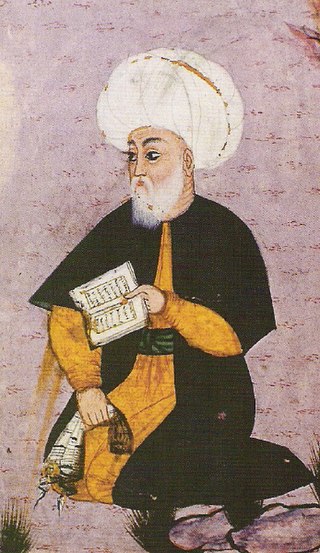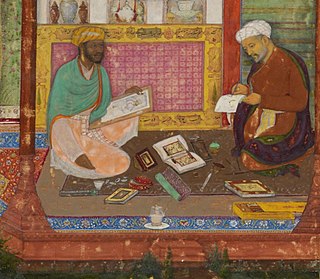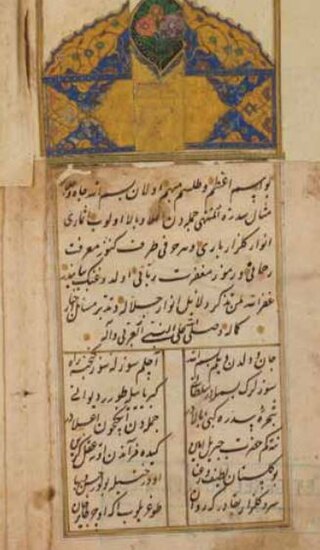
Mehmed III was the sultan of the Ottoman Empire from 1595 until his death in 1603. Mehmed was known for ordering the execution of his brothers and leading the army in the Long Turkish War, during which the Ottoman army was victorious at the decisive Battle of Keresztes. This victory was however undermined by some military losses such as in Győr and Nikopol. He also ordered the successful quelling of the Jelali rebellions. The sultan also communicated with the court of Elizabeth I on the grounds of stronger commercial relations and in the hopes of England to ally with the Ottomans against the Spanish.

Mustafa I, called Mustafa the Saint during his second reign, and called Mustafa the Mad by historians, was twice the sultan of the Ottoman Empire from 22 November 1617 to 26 February 1618, and from 20 May 1622 to 10 September 1623. He was the son of sultan Mehmed III and Halime Sultan.

Suleiman I, commonly known as Suleiman the Magnificent in Western Europe and Suleiman the Lawgiver in his Ottoman realm, was the longest-reigning sultan of the Ottoman Empire from 1520 until his death in 1566. Under his administration, the Ottoman Empire ruled over at least 25 million people.

Seyid Ali Imadaddin Nasimi, commonly known as simply Nasimi, was a 14th- and 15th-century Hurufi poet who composed poetry in his native Azerbaijani, as well as Persian and Arabic languages. He is regarded as one of the greatest Turkic poets of his time and one of the most prominent figures in Azerbaijani literature. Some sources also mention that he was born in Baghdad in 1339.

Nūr ad-Dīn 'Abd ar-Rahmān Jāmī, also known as Mawlanā Nūr al-Dīn 'Abd al-Rahmān or Abd-Al-Rahmān Nur-Al-Din Muhammad Dashti, or simply as Jami or Djāmī and in Turkey as Molla Cami, was a Persian Sunni poet who is known for his achievements as a prolific scholar and writer of mystical Sufi literature. He was primarily a prominent poet-theologian of the school of Ibn Arabi and a Khwājagānī Sũfī, recognized for his eloquence and for his analysis of the metaphysics of mercy. His most famous poetic works are Haft Awrang, Tuhfat al-Ahrar, Layla wa Majnun, Fatihat al-Shabab, Lawa'ih, Al-Durrah al-Fakhirah. Jami belonged to the Naqshbandi Sufi order.

Persian literature comprises oral compositions and written texts in the Persian language and is one of the world's oldest literatures. It spans over two-and-a-half millennia. Its sources have been within Greater Iran including present-day Iran, Iraq, Afghanistan, the Caucasus, and Turkey, regions of Central Asia, South Asia and the Balkans where the Persian language has historically been either the native or official language.
Turkish literature comprises oral compositions and written texts in the Turkish language. The Ottoman form of Turkish, which forms the basis of much of the written corpus, was highly influenced by Persian and Arabic literature, and used the Ottoman Turkish alphabet.

Azerbaijani literature is written in Azerbaijani, a Turkic language, which is the official state language of the Republic of Azerbaijan, where the North Azerbaijani variety is spoken. It is also natively spoken in Iran, where the South Azerbaijani variety is used, and is particularly spoken in the northwestern historic region of Azerbaijan. Azerbaijani is also spoken natively in Russia, Georgia and Turkey. While the majority of Azerbaijani people live in Iran, modern Azerbaijani literature is overwhelmingly produced in the Republic of Azerbaijan, where the language has official status. Three scripts are used for writing the language: Azerbaijani Latin script in the Republic of Azerbaijan, Arabic script in Iran and Cyrillic script formerly used in Soviet Azerbaijan.

A Persianate society is a society that is based on or strongly influenced by the Persian language, culture, literature, art and/or identity.

Muhammad bin Suleyman, better known by his pen name Fuzuli, was a 16th-century poet who composed works in his native Azerbaijani, as well as Persian and Arabic. He is regarded as one of the greatest poets of Turkic literature and a prominent figure in both Azerbaijani and Ottoman literature. Fuzuli's work was widely known and admired throughout the Turkic cultural landscape from the 16th to the 19th centuries, with his fame reaching as far as Central Asia and India.

In Islamic cultures of the Middle East, North Africa, Sicily and South Asia, a Diwan is a collection of poems by one author, usually excluding his or her long poems (mathnawī).

Ahmed Effendi, better known by his mahlasNedîm, was an Ottoman lyric poet of the Tulip Period. He achieved his greatest fame during the reign of Ahmed III. He was known for his slightly decadent, even licentious poetry often couched in the most staid of classical formats, but also for bringing the folk poetic forms of türkü and şarkı into the court.

Yahya Kemal Beyatlı, born Ahmet Âgâh, generally known by the pen name Yahya Kemal, was a leading Turkish poet and author, as well as a politician and diplomat.

İbrahim Şinasi Efendi was a pioneering Ottoman intellectual, founder of Turkish dramaturgy, author, journalist, translator, playwright, linguist and newspaper editor. He was the innovator of several fields: he wrote one of the earliest examples of an Ottoman play, he encouraged the trend of translating poetry from French into Turkish, he simplified the script used for writing the Ottoman Turkish language, and he was one of the first of the Ottoman writers to write specifically for the broader public. Şinasi used his newspapers, Tercüman-ı Ahvâl and Tasvîr-i Efkâr, to promote the proliferation of European Enlightenment ideals during the Tanzimat period, and he made the education of the literate Ottoman public his personal vocation. Though many of Şinasi's projects were incomplete at the time of his death, "he was at the forefront of a number of fields and put his stamp on the development of each field so long as it contained unsolved problems."
Şemseddin Ahmed (1469–1534), better known by his pen name Ibn Kemal or Kemalpaşazâde, was an Ottoman historian, Shaykh al-Islām, jurist and poet.
Mesihi (Messiah) of Prishtina, known in Ottoman Turkish as Priştinali Mesihi, was one of the best known Ottoman poets of the late 15th and early 16th centuries during the Bayezid II era and is regarded as one of the earliest Albanian poets.

Yahya bey Dukagjini was an Albanian poet and military figure. He is known for his Ottoman Turkish diwan poems of the 16th century.
Habibi was a late 15th and early 16th century poet. He is regarded as the most important Azerbaijani poet of his generation.
Süleyman Fehim Efendi (1789–1846) was a teacher and poet of Persian in the Ottoman Empire.
The İskendernâme is a poem by the Turkish poet Taceddin Ahmedi (1334–1413), completed in the early fifteenth century. It is the first work of Ottoman historiography and the first rendition of the Alexander Romance in Turkish.














